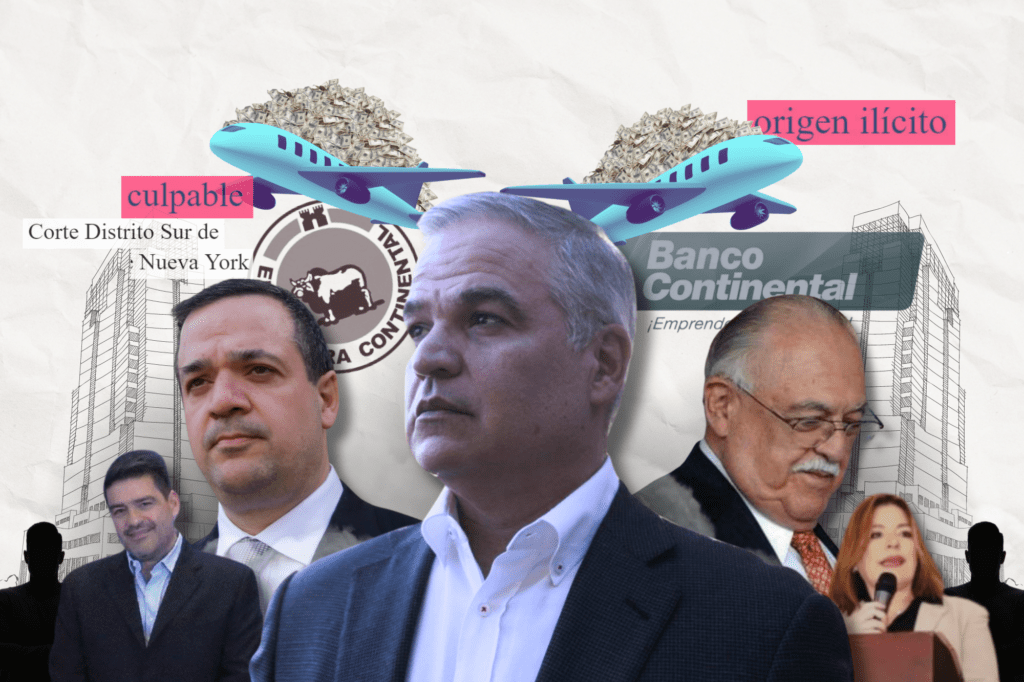The Criminal Appeals Court in the Francisco Morazán department ruled in favor of returning properties, vehicles, bank accounts and businesses that Honduran authorities had seized from the Rosenthal family in 2019. Banco Continental and Empacadora Continental are among the seized businesses, both of which allegedly laundered drug proceeds, according to US authorities. Additionally, the International Centre for Settlement of Investment Disputes (ICSID) found that Honduras is responsible for jeopardizing the Rosenthal family estate.
Text: Célia Pousset
Cover: Persy Cabrera
On June 20, the Criminal Appeals Court of the Francisco Morazán department dismissed asset forfeiture proceedings against the property of Yani Benjamín Rosenthal Hidalgo, Jaime Rolando Rosenthal Oliva, César Augusto Rosenthal Hidalgo, Adela Patricia Rosenthal Hidalgo, Edwin Mayer Rosenthal Coello, Edwin Mayer Rosenthal Oliva and other individuals.
The ruling calls for Honduran authorities to return 32 assets, 12 bank accounts, more than 100 vehicles, two aircraft and more than 20 million lempiras in cash to the Rosenthal family.
In July 2017, Yani Rosenthal, current president of the Liberal Party, pled guilty to laundering drug proceeds for the Cachiros, one of the most powerful criminal organizations in Honduras. He faced trial in the US District Court for the Southern District of New York and was sentenced to 29 months in prison. Yankel Rosenthal, former minister of investments during Juan Orlando Hernández’s first term, and Jaime Rosenthal, a banker who passed away in Honduras in 2019, were sentenced in the same case.
Both Yankel and Yani pled guilty to money laundering charges and served their sentences before returning to Honduras. Yani’s criminal record did not prevent him from running for president in 2021. However, an asset forfeiture process against the Rosenthal family was underway at the time.
In September 2019, most of the Rosenthal family’s assets were seized by Honduran authorities. At the time, a judge ordered the confiscation of 34 assets, seven businesses and 10 bank accounts. Marlon Duarte, the family’s attorney, said they would appeal the court’s decision. Almost four years later, the Criminal Appeals Court ruled in favor of the Rosenthal family.
The ruling contradicts the US Treasury Department’s Office of Foreign Assets Control (OFAC) narco-terrorist blacklist, which lists dozens of businesses owned by the Rosenthal family.
The Attorney General’s Office attempted to prove that those businesses were “tainted by capital from dubious sources.” However, the court found that transactions were regulated by the National Bank and Insurance Commission (Comisión Nacional de Banca y Seguros), and that “prosecutors were unable to link those businesses with the accumulation of capital by the Rivera Maradiaga brothers (leaders of the Cachiros), Wilter Blanco, and José Handal.”
Contracorriente tried to contact Yani Rosenthal but received no response by the time of publication. In a telephone interview, Duarte said, “Proceedings lasted a decade. From early on, we were able to prove the legal origin and destination of every single transaction by Grupo Continental. Prosecutors sought to seize 90 percent of assets owned by the Rosenthal family and Grupo Continental.”
He also mentioned that the Rosenthal family was a victim of the Hernández administration, and that the previous ruling, which was overturned, had been issued arbitrarily: “Hernández wanted to destroy the Rosenthal family estate, which is valued at 5 billion lempiras, almost five percent of the Gross Domestic Product. After the Hernández regime, which had a grip on the entire system, the court issued a favorable ruling.” Moreover, many assets are in bad condition; individuals have trespassed on some of them, while others were involved in fraudulent transactions after being seized by Honduran authorities, he explained.
The Criminal Appeals Court, which has national jurisdiction over asset forfeiture, is composed of Lizeth Vallecillo, Iván Castelar and Armando Corea. In May 2024, the court exonerated Miguel Navarro, former congressional representative from the Libre Party, of orchestrating the murder of Rafael Leonardo Lagos.
Contracorriente contacted a prosecutor from the Attorney General’s Office who is assigned to asset forfeiture cases and a prosecutor from the Special Prosecutor’s Office Against Organized Crime, but both said they were not authorized to disclose information.
The Rosenthal family: “Money launderers for drug traffickers”
The Rosenthal family’s businesses were used to launder drug proceeds, according to US authorities. In September 2015, the Drug Enforcement Agency (DEA) interrogated Yankel Rosenthal, owner of the soccer club Marathón, over his ties to notorious Honduran drug traffickers:
Rosenthal: Can I see the pictures of the people again?
DEA: Sure. Why don’t I just list them. I mean, you know all of them, Hector.
Rosenthal: No, Hector . . . no, Hector, I know him. He bought a house from me. And he supported my soccer team.
DEA: How did he support your soccer team?
Rosenthal: It’s a society, right? It’s a corporation. He bought some shares of the team.
DEA: With his drug trafficking proceeds?
Rosenthal: That I don’t know. But uh . . .
DEA: Do you know him to be drug trafficker?
Rosenthal: Hearsay, yeah of . . . but, no, I know. He is . . . Honduras is a small place, no, but I . . .
Money laundering was carried out through several businesses like the soccer team and a meat-processing firm, according to the DEA. Before trafficking drugs, the Cachiros used to traffic cattle. They owned a company called Ganaderos Agricultores del Norte, which used to purchase head of cattle with drug proceeds. Empacadora Continental then purchased the cattle and processed the meat.
Most of the meat, as well as the Cachiros’ cocaine, was exported to the US. Between 2008 and 2013, Empacadora Continental paid Ganaderos Agricultores del Norte a total of $6.8 million. This is one of the companies that was used to launder money, in addition to the Rosenthal family’s offshore companies like Inversiones Continental, based in Panama, which collected the Cachiros’ profits.
An investigation by Contracorriente from August 2023 revealed that the Valle Valle family is recovering its assets due to the slowness and inaction of the Honduran justice system and the lack of oversight from the Administrative Office of Seized Properties (OABI).
At the time, Dennis Cheng, former director of Systems for Management of Seized and Forfeited Assets in Latin America at the Organization of American States (OAS), told Contracorriente that the main advantage of asset forfeiture law (Ley de Privación) is that “it destroys economic power held by organized crime.”
Duarte explained that the appeals court’s ruling is related to a favorable resolution by ICSID, which has not issued a ruling yet. “It would be illogical to think that political chicanery was used to obtain a favorable ruling from the new Supreme Court Justices,” he said.
He also explained that the Cachiros made transactions not only with Banco Continental, but also other banks, and even the government made transactions with companies owned by drug traffickers through the Sistema de Administración Financiera Integrada (Siafi).
In view of irregular auctions and the squandering of Banco Continental’s trust fund, the State should be held responsible, Duarte said. “US authorities didn’t even require Ethel Deras, president of the Bank and Insurance Commission, to liquidate the bank,” he added.
Lastly, he maintains that the resolution does not contradict the ruling issued by the court in New York since it didn’t order the seizure of the family’s assets, but did impose a $250,000 fine, which has been paid.







